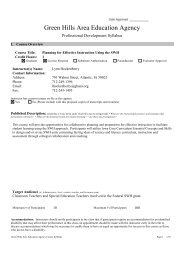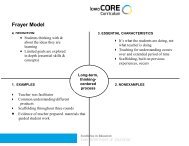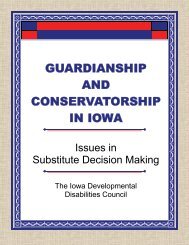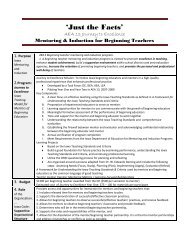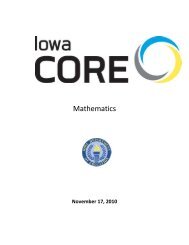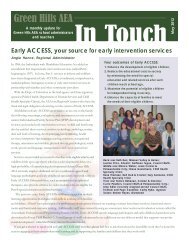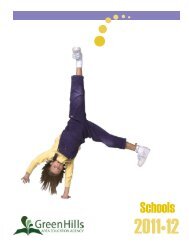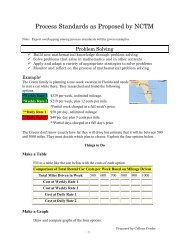The Arc's Self-Determination Scale: Procedural Guidelines
The Arc's Self-Determination Scale: Procedural Guidelines
The Arc's Self-Determination Scale: Procedural Guidelines
You also want an ePaper? Increase the reach of your titles
YUMPU automatically turns print PDFs into web optimized ePapers that Google loves.
the past, may believe that she will be ignored again and, likewise,<br />
refrain from initiating the action.<br />
Like perceptions of control, perceptions of efficacy and<br />
expectancy have been linked to academic achievement and<br />
persistence at academic activities (Lent, Bron, & Larken, 1984;<br />
Ollendick & Schmidt, 1987). Very little research has examined<br />
the self-efficacy and efficacy expectations of individuals with<br />
disabilities. Most of the extant literature in the area of learning<br />
disabilities focuses on changing self-efficacy and efficacyexpectations<br />
through environmental or instructional modifications<br />
(Schunk, 1989). Wehmeyer (1994a) found that individuals with<br />
mental retardation held less adaptive attributions of efficacy and<br />
expectancy than did non-disabled peers and that such attributions<br />
became less adaptive as the student got older, a trend not<br />
consistent with typical developmental functions for these<br />
attributes.<br />
Attributions of efficacy and expectancy emerge as children and<br />
adolescents interact with the world around them. One holds<br />
positive beliefs of efficacy and efficacy expectations because one<br />
has acquired specific skills, exercised such skills and experienced<br />
the outcomes anticipated by such activities. Several factors limit<br />
the acquisition of these perceptions by people with disabilities. As<br />
Kennedy (1993) highlighted, overprotection by well-intentioned<br />
others frequently limits opportunities for children and youth with<br />
disabilities to engage in actions that would enable them to establish<br />
a sense of efficacy and efficacy expectations. <strong>The</strong> general<br />
assumption of incompetence spawned by the disease and deficit<br />
models of disability have, as previously suggested, limited even<br />
the opportunity for people with disabilities to learn skills, like<br />
goal-setting and decision-making skills, that would contribute to<br />
efficacy expectations.<br />
Overly structured environments, including many special<br />
education classrooms, limit the opportunities to acquire skills<br />
related to choice and decision-making, hinder the development of<br />
an internal locus of control, and prohibit students from learning<br />
that they are effective and that their behaviors can have beneficial<br />
outcomes. Again, an educational program that focuses on<br />
promoting self-determined behavior through the means detailed<br />
above will provide the opportunities students need to develop<br />
adaptive perceptions of self-efficacy and efficacy expectations.<br />
<strong>Self</strong>-Awareness and <strong>Self</strong>-Knowledge<br />
In order for one to act in a self-realizing manner, one must possess<br />
a basic understanding of one’s strengths, weaknesses, abilities and<br />
limitations as well as knowledge about how to utilize these unique<br />
attributions to beneficially influence one’s quality of life. At the<br />
38




